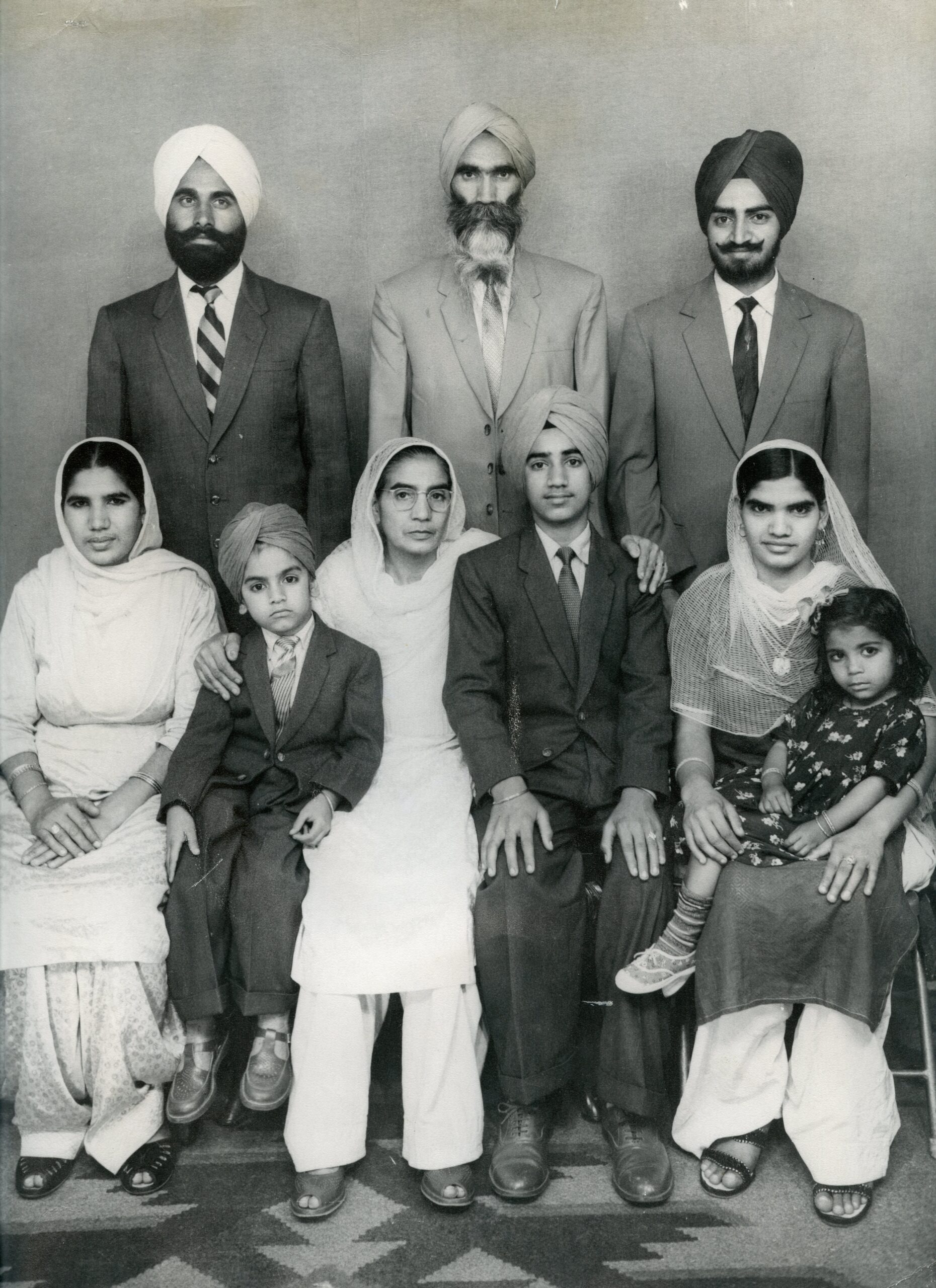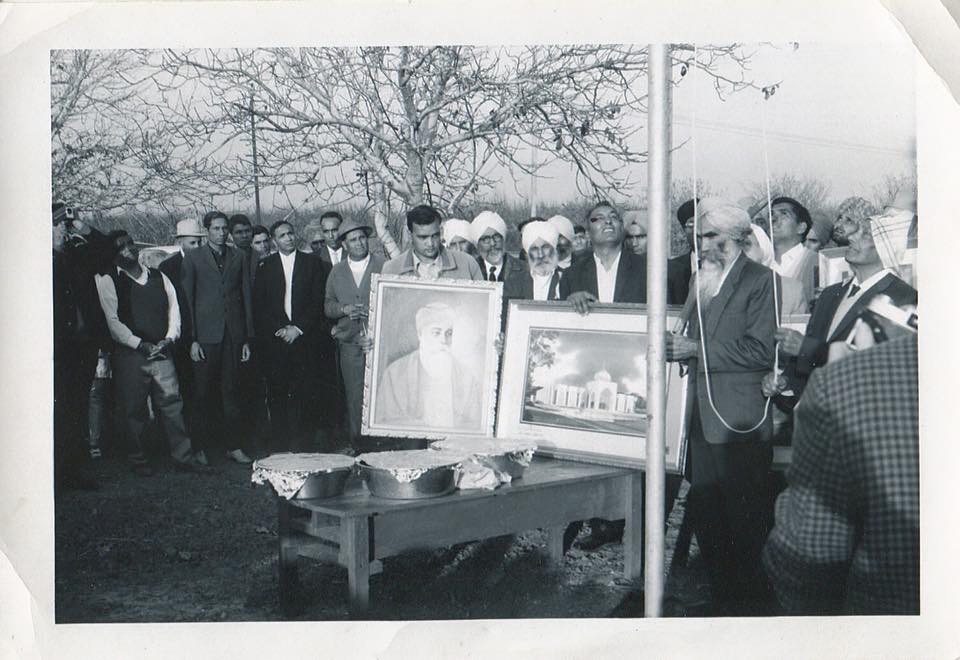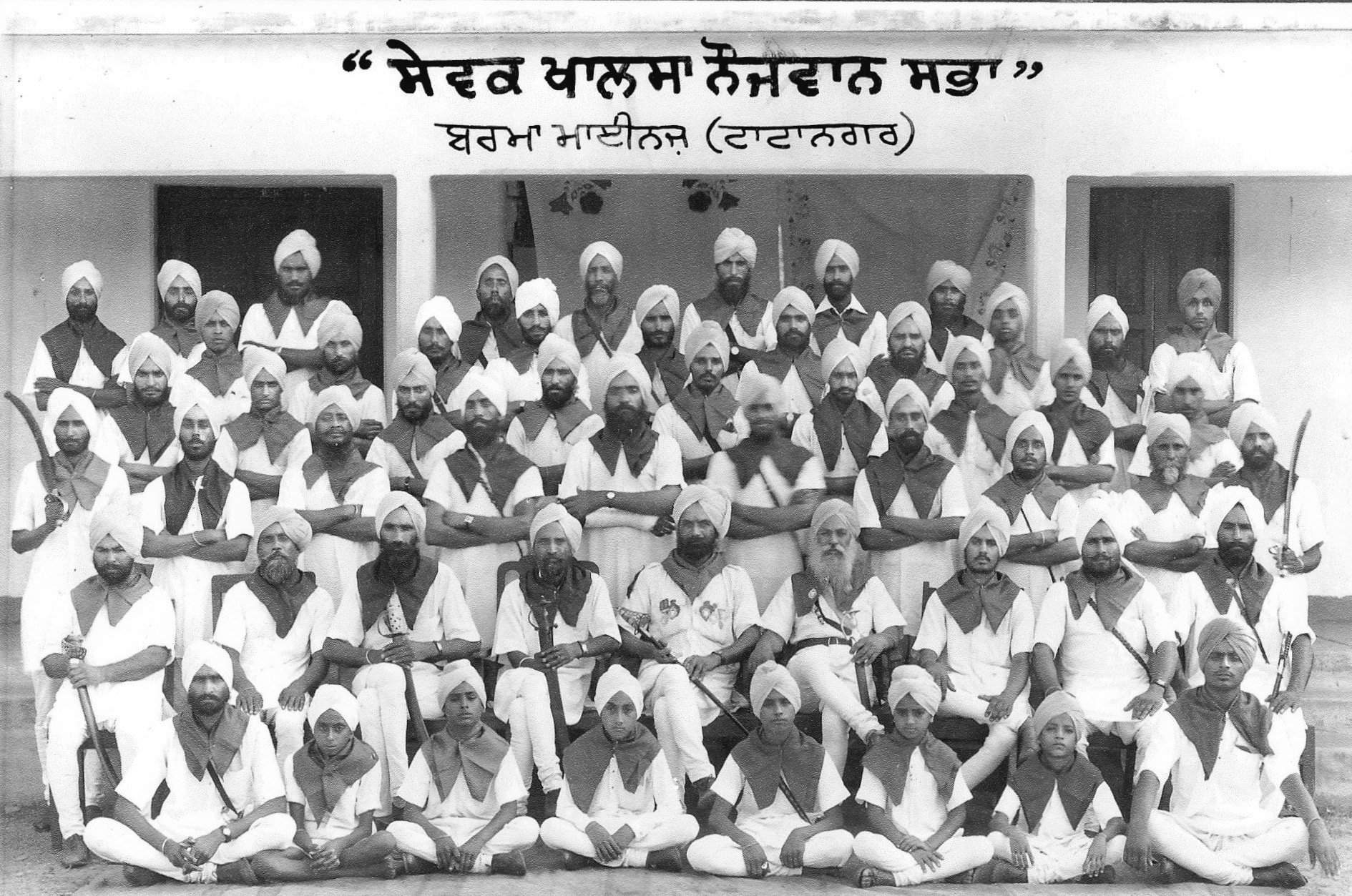Ranjit Singh Grewal
Ranjit Singh Grewal (March 5, 1913 – August 7, 2001) was one of the first Amritdhari Sikhs to settle in the Yuba City area. Being an Amritdhari Sikh means fully committing oneself to the way of life according to the Sikh code of conduct after ceremonially drinking ambrosial water (amrit). He was a farmer in Punjab before laboring as a steelworker in Bihar in eastern India. In 1962, he relocated to Yuba City where he worked in peach farming. He played an important role in the community’s religious history, and may have been the first person to bring the Sri Guru Granth Sahib to Yuba City. Ranjit Singh also performed a Sikh prayer called Ardaas at the dedication ceremony for Yuba City’s first Gurdwara in 1969.
Ranjit Singh descends from a long lineage of devout Sikhs who trace their history back to Guru Gobind Singh’s time at the turn of the eighteenth century. His parents, Jathedar Harbhajan Singh and Raj Kaur, were strict Sikhs. His father never took medicine in his life, and he only ate vegetarian food cooked by Amritdhari Sikhs from traditional iron cookware. His father initiated the children in the family to take Amrit from birth, and he also participated in the performance of Asa di Var (a Sikh prayer) every week in the early morning in the village. Ranjit’s father discouraged his children from pursuing education because he feared that the Westernized schools would lead them astray from Sikhi.
Ranjit was born in Chak 74, Lyallpur in Punjab (now Faislabad, Pakistan). Like his father, Ranjit also worked as a farmer and devoted his life to Sikhi. He only received five years of education in a village school, but he placed a high priority on his children’s education. He didn’t want his children to live a hard life filled with manual labor like he had. The only time he borrowed money was to pay for his childrens’ education. He taught his children that nothing of value can be gained without hard work: “You can’t get money without investing time and hard work.”

Grewal family with Ranjit Singh Grewal (standing in back in the middle) before his departure for the US, Calcutta, India, 1962.

Ranjit Singh Grewal (holding gurdwara rendering on the right), Gurdwara dedication, November 29, 1969.
In 1928, he married Sant Kaur Grewal in her home village of Katani Kalan village in the Ludhiana district in Punjab. Both Ranjit Singh and his future wife were attending a wedding between their families. The grandfathers on both sides decided it would be a good idea to arrange Ranjit Singh’s marriage with Sant Kaur at the same time.
In the early 1930s, Ranjit Singh moved his young family to Tatanagar in Bihar where he worked as a steelworker like many other Punjabis. Ranjit’s brother encouraged him to join him in Bihar because of the good salary and free medical coverage offered by the Tata Company. During the Second World War, the family endured bombing raids by the Germans as the Tata steel plan was a prime military target. His family returned to Punjab during the war for their safety while Ranjit Singh stayed behind for work.
Ranjit possessed an extraordinary capacity for hard work. As a steelworker, he endured work conditions that pushed him to the limits of human endurance. For 29 years, he performed difficult labor as a looper whose job involved grabbing molten steel rods with a tong and moving them from one roller to another in dangerous conditions and in extreme heat. He needed to tie up his beard behind a cloth so that it did not catch on fire. He frequently sustained steam burns on his hands. It was so hot that a looper could only stay in close proximity to the molten steel rods for 3o minutes at a time without becoming dehydrated. For three decades, he worked eight-hour shifts alternating between 30 minutes near the steel with equal amounts of time spent drinking water, cooling off, and recovering from the heat and dehydration before exposing himself to the harsh conditions repeatedly throughout the work day. He once suffered a bad accident at the plant in which one of the rods struck his back hip. He was hospitalized for a month, experiencing back pain for the rest of his life. His monthly salary was approximately 250 rupees in addition to the free company housing and medical care.
Established in 1948, the Burma Mines Gurdwara in Tatanagar formed the heart of the Grewal family’s lives. The family frequently took a fifteen-minute walk to the Gurdwara for prayers, school, and special festivals. Ranjit Singh was an active member of the Burma Mines jatha (group) that regularly organized shabad kirtans (devotional singing of Gurbani) and kathas (lectures about Gurbani). They also organized large programs for the birth anniversaries of the Gurus. For the Vaisakhi festival, the jatha organized nagar kirtans (neighborhood devotional singing), preparing langar for thousands of devotees. Each Saturday, he and his son, Manohar, awoke in the early morning to perform the Asa di Var prayer at the Gurdwara. The family also participated in the Gurdwara for Ran Sabai programs involving all-night devotional singing from 6pm to 6am. Swarn Kaur learned to recite the Guru Granth Sahib at the Gurdwara, and Harjit and Joginder attended the khalsa school on site. Manohar, Swarn, and Joginder frequently sang kirtans at the Gurdwara together.
In March 1962, Ranjit Singh Grewal traveled alone to the United States. Initially, he lived with his daughter, Swarn Kaur Johl and her family in Yuba City. Before he left India, his daughter made a special request that he bring the Guru Granth Sahib (which Sikhs believe is the living Guru) to reside in her home, explaining that the only Gurdwara was far away in Stockton. The next year Ranjit’s wife, Sant Kaur, and their three sons relocated to Yuba City where they were sponsored by their daughter, Swarn Kaur Johl. Swarn Kaur was one of the first Punjabi women in the Yuba City area to sponsor her relatives to the United States.
Even though Ranjit Singh was in his fifties, he resumed the hard work of farm labor on a farm owned by Richard Wilbur and his family. His son, Kuldip, remembers working with his father during his summer breaks from college. They often hoed weeds to create fire breaks near the buildings on Wilbur Farms. His other son, Harjit, also remembers working in the fields with his father, especially helping to work the powerful irrigation pumps that required a great deal of strength, due to the water’s force. He recalls his father working in extreme heat in the summer and chilly weather in the winter. Wilbur would only permit Ranjit Singh to prune the young fruit trees because shaping the trees in their early development is a critical skill. Ranjit waited until his youngest son completed his professional education in 1983 before retiring from farm labor at the age of 70.

Sevak Khalsa Naujvan Sabha, Bhurma Mines, Tatangar, India, 1930s.
He led the life of a Gursikh: he maintained the five Ks (the Sikh articles of faith), recited the nitnem (the daily prayers), and earned an honest living. He recited most of his prayers by memory in the morning at home, as he worked in the field during the day, and as he sat on the living room couch in the evening. He also brought his Gutka (abridged Sikh scripture) to the farm to recite prayers as time allowed.
In the Sikh community, Ranjit Singh Grewal was respected for his observance and knowledge of Sikhi. He recited Ardas (a Sikh prayer) for the dedication ceremony for the Yuba City Gurdwara in November 1969 on the 500th birth anniversary of Guru Nanak.* It was an honor to give the opening prayers for a Gurdwara, and it also demonstrates Ranjit’s knowledge of the Sikh scripture. During the first decade after he arrived, the Sikh community in Yuba City had dwindled to a small number of families. At this time, most of the community would gather at one house for special occasions. Most of the Sikh men at that time drank alcohol and ate meat, both of which were not allowed for strict Sikhs. As a measure of respect, the women prepared Ranjit’s food separately from everyone else’s so that he could maintain his vows as a Sikh. Despite his strict observance of Sikh values and code of conduct, he refused to participate as one of the honored panj piare (five beloved ones) in the Sikh parade on several occasions because, in his estimation, “I’m still not at that high level.”
According to his family, Ranjit Singh was content in life. He recited the daily Sikh prayers and lived a simple life. He accepted hukam (divine will) without complaint. According to his son, Manohar, his father “had no attachment to maya (the material world).” After his wife passed away, he gave away her jewelry right away to all of his children. One day his youngest son, Kuldip, showed a quarter he had found to his father. His father replied, “You didn’t earn that money so you can’t spend it. You must give it to the Gurdwara.” At that time, Kuldip thought to himself that he could have bought two Thrifty ice cream scoops with that quarter. As a result, this lesson made a lasting impression on him about the value of hard work. Kuldip also remembers that his father would often tell his children: “As long as I’m alive, please don’t do two things. Don’t drink alcohol and don’t cut your hair.” These examples illustrate how he followed the Sikh teachings in his daily life and passed them down to his children.
Although he remained in chardi kalaa (optimistic), he missed the close relationships and conversations he shared with other devout Sikhs in Bihar. In the early years after moving to Yuba City, there were few other like-minded Sikhs with whom he could converse about his faith. For this reason, he felt that the happiest period of his life was living together with other devout Sikhs in the steel town in eastern India.
Toward the end of his life, he insisted that he wanted two wishes to be fulfilled. First, he hoped that his wife would pass away before him so that he could take care of her until the end of her life. Second, he declared, “I want to die in Yuba City.” Even though he lived in San Jose with his children, he wanted to pass away in Yuba City so that his many relatives and friends would not be inconvenienced traveling to San Jose for the funeral. Both wishes were fulfilled. His wife passed away two years before him in 1999. When he knew his end was drawing near, Ranjit insisted that his son drive him to Yuba City; he passed away a few days later at Rideout hospital in the Yuba City area. During his last day, he urgently requested his children to perform Rehras Sahib, an evening prayer that should be recited at sunset. His daughter exclaimed, “Why? It’s too early.” But he persisted, so his children obliged him. By the time they had finished reciting the prayer, Ranjit Singh had passed away. His son, Manohar, later returned to Punjab where he dispersed his father’s ashes in the canal near the historic Katana Gurdwara Sahib where his wife’s ashes had previously been immersed.
Ranjit Singh Grewal and his wife, Sant Kaur, raised six children: Swarn Kaur Johl, Gurdial Kaur Takhar, Manohar Singh Grewal, Joginder Kaur Dhaliwal, Harjit Singh Grewal and Kuldip Singh Grewal.
All photographs provided by the Grewal family.
Interviews by Nicole Ranganath with Manohar Singh Grewal, Phone, October 13, 2020, Joginder Kaur Dhaliwal and Dal Dhaliwal, ZOOM, July 27, 2022, Kuldip Singh Grewal, ZOOM, July 28 and July 29, 2022, and Harjit Singh Grewal, Rocklin, CA, August 9, 2022.
*The groundbreaking ceremony for Yuba City’s first Gurdwara on Tierra Buena Road is recorded in Hari Singh Everest’s journal on November 29, 1969.
